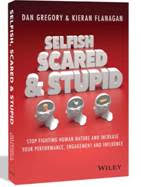Gruen Planet regular Dan Gregory and behavioural researcher Kieran Flanagan have written a book about laziness. Specifically, the value of the lazy employee. If that strikes you as contrary to popular notions concerning efficiency and productivity, you are not alone. If you’re expecting a caveat, here it is: lazy employees also have to be smart to be effective.
Okay then.
So, right off the bat, are you a SLE (Smart Lazy Employee), and how do you sport other SLEs?
“Smart lazy people are inherently creative, which obviously makes them difficult,” say the authors. “So leaders need to accept that some challenge in their lives is useful. Certainly, we have always hired people who annoyed us, just a little bit, because they challenge you to think more openly and critically. As we now live in a time of unprecedented change, the lazy employees who are more creative with their time, who do challenge conventional process and do seek an easier way will be highly prized and incredibly valuable. What we need to identify in employees in an entrepreneurial tendency. In other words, those who will apply an entrepreneurial, ‘better way’ mindset within our organisations.”
But if a lazy employee comes up with a good idea, won’t she be too lazy to fight the bureaucracy of a large organisation in order to get her idea implemented? In other words, don’t you also need smart lazy bosses, or people in high places who like SLEs for SLEs to be successful?
“Smart lazy people are critical in leadership positions, not simply because they can appreciate and facilitate ‘lazy’ solutions brought to them by their employees, but also because they have an eye for efficiency and for streamlining processes themselves.
Certainly, the act of delegation requires a capacity to let others do the work rather than a adopting a more diligent, micromanaging or controlling approach. Strategic thinking too requires the ability to apply limited resources, including time and effort, to achieve the desired outcomes most efficiently. Having said that, the world is filled with people whose titles denote leadership even though they are little more than caretakers – less interested in results than process. We’ve all met the “that’s not how we do things around here” kind of leader.”
Right. So what are the key differences between SLE’s and bad, work-avoiding, unprofessional makeweights?
“The critical difference is the results they produce. In other words, smart lazy people don’t simply avoid work, they identify short cuts and efficiencies and streamline processes. They are valuable because the work gets done even though less effort is expended. Almost every technological advance in human history that was not linked to our survival has had an underlying goal – make life more comfortable or more effortless. Obviously, there are those who simply avoid work and achieve nothing. That is obviously a short term strategy as at some point you’ll get found out.”
It sounds like you might simply be re-branding clever free-thinkers in a way that draws attention to a truism: businesses need people who think for themselves. Comments?
“The truth is, we are all lazy. Even diligence is its own form of laziness – it’s a laziness of thought. It is far easier to press your nose to the grind stone and labour away than it is to apply original ‘free thinking’ to your activity. The real issue is that the corporate world has done a bad job of recognising and supporting both. For all the talk of the need for clever free-thinkers, the corporate world has been far more likely to reward and promote obedient, compliant cogs. They’re just less trouble than the thinkers if we’re honest. This is why real leadership is an issue in a lot of organisations.”
So. If you’re smart you should get lazy, quick.






![Strategic Alliances with Simone Novello [FREE INFOGRAPHIC]](https://anthillonline.com/wp-content/uploads/2015/08/Capture6-300x194.jpg)
![How did Sean Clark build a $300 million turnover company from a $500 AdWords investment? [CHEAT SHEET]](https://anthillonline.com/wp-content/uploads/2016/03/SEAN-CLARK-cheatsheet-NSFU-02.pdf-Box-2016-03-16-14-43-21-100x75.png)
![How to price your product or service in 8 steps with Steve Major [FREE INFOGRAPHIC]](https://anthillonline.com/wp-content/uploads/2015/07/Screen-Shot-2015-11-26-at-11.40.10-100x75.png)
![How to pitch sales and marketing ideas to your boss with James Tuckerman [FREE REPORT]](https://anthillonline.com/wp-content/uploads/2015/07/Render-3-100x75.png)
![The Top 5 Most Insanely Dumb Mistakes made by Rookie and Seasoned LinkedIn Users, with David Hobson [FREE REPORT]](https://anthillonline.com/wp-content/uploads/2015/07/Screen-Shot-2015-11-26-at-14.29.18-100x75.png)
![Seven steps to crafting the perfect email, with James Tuckerman [FREE REPORT]](https://anthillonline.com/wp-content/uploads/2015/08/7-steps-cheatsheet-3d-cover-nuova--100x75.png)

![Myths busted! The next six minutes may change a lot of what you think you know [VIDEO] Iron Maiden](https://anthillonline.com/wp-content/uploads/2013/03/bigstock-Medieval-Torture-Equipment-2064666-300x350.jpg)
![Three little words I hate to hear: design by committee [VIDEO]](https://anthillonline.com/wp-content/uploads/2013/08/designByCommittee-300x350.jpg)
![Want more credibility and influence? Unlock the 12 principles of persuasion checklist [FREE DOWNLOAD]](https://anthillonline.com/wp-content/uploads/2016/03/james-persuasion-and-influence-nfsu-02.pdf-Box-2016-03-24-15-09-44-300x194.png)
![How to secure lucrative sponsorships in five steps [CHEAT SHEET]](https://anthillonline.com/wp-content/uploads/2016/02/jackie-fast-meme-04-100x75.jpg)
![The Alchemy of Negotiation with Matt Lohmeyer [FREE REPORT]](https://anthillonline.com/wp-content/uploads/2015/07/Capture-100x75.jpg)
![How to expand into New Markets with Elsita Meyer-Brandt [CHEAT SHEET]](https://anthillonline.com/wp-content/uploads/2015/07/Screen-Shot-2015-11-26-at-15.52.30-100x75.png)
![New Zealand’s Xero eyes US IPO, further disruption as subscribers increase [INFOGRAPHIC]](https://anthillonline.com/wp-content/uploads/2014/07/sruuuuujana-212x194.png)
![Ever wonder if your ‘content marketing’ is really just crap? You gotta see this! [INFOGRAPHIC]](https://anthillonline.com/wp-content/uploads/2014/08/content-100x75.jpg)
![7 Business Lessons From Game of Thrones [INFOGRAPHIC]](https://anthillonline.com/wp-content/uploads/2014/10/infographic-games-of-thrones-041-100x75.jpg)
![How to build your own Media Empire… In seven steps with Nathan Chan [INFOGRAPHIC]](https://anthillonline.com/wp-content/uploads/2014/10/Nathan-Chan-Infographic-e1413419529176-100x75.jpg)
![5 Business Lessons From Tinder [INFOGRAPHIC]](https://anthillonline.com/wp-content/uploads/2014/10/Tinder-Elegant-Infographic-100x75.jpg)



